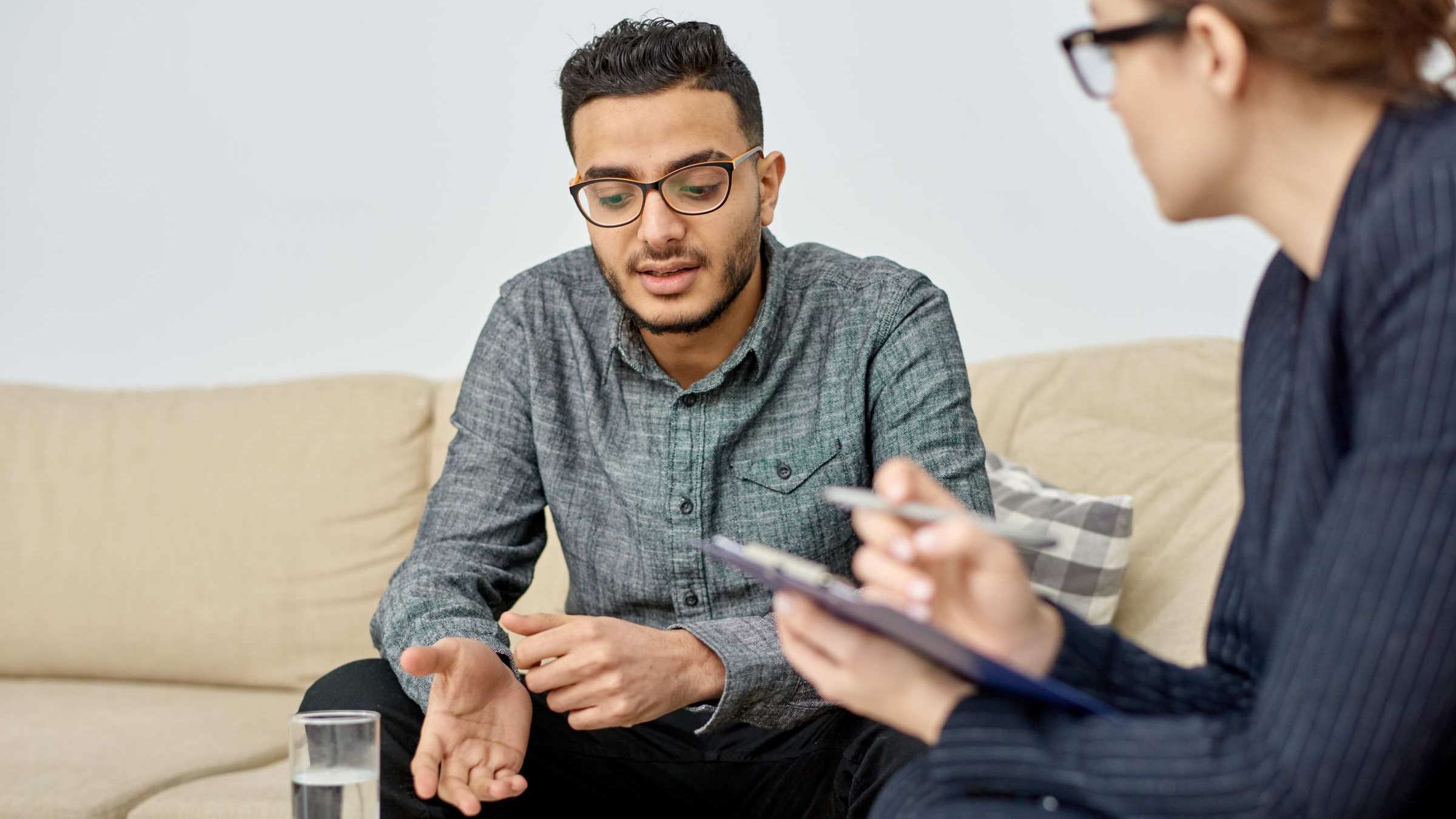Key takeaways:
-
A therapy session without insurance can cost anywhere from $65 to over $250. The amount you pay depends on several factors, including the type of treatment and where you receive therapy.
-
If you don’t have insurance, you can still get free or low-cost mental health therapy. You can check with professional organizations or ask about services at local university clinics.
-
Ask your therapist about sliding-scale payment options and find out if there are resources at your job.
 SeventyFour/iStock via Getty Images
SeventyFour/iStock via Getty Images
The cost of therapy may be a concern if you don’t have insurance. But you should never avoid seeking care because you don’t have coverage. There are many resources that provide free or low-cost mental health services.
How much does therapy typically cost?
A therapy session without insurance costs anywhere from $65 to over $250 per hour, according to GoodTherapy. The amount you pay is based on the type of therapy and other factors. But, on average, expect to pay $100 to $200 for a 1-hour session in most parts of the country.
The American Psychological Association (APA) estimates it takes 15 to 20 sessions to see improvement from therapy. But most people see meaningful results over a longer period, like 20 to 30 sessions.
Generally, after the initial assessment, your therapist will make a treatment plan. For example, they may recommend 20 sessions. If each session is $150, your total costs would be about $3,000. If you need additional sessions that will increase your out-of-pocket costs.
It’s a good idea to discuss treatment length with your therapist to help you be better prepared and make the most of each session.
What factors affect the cost of therapy?
Without insurance, expect to pay the full cost of treatment. However, your total costs depend on many factors such as:
-
Treatment type: Individual, couples therapy, and group therapy may have different fees. Specialized services, like treatment with a psychiatrist, cost more.
-
Therapist’s expertise: A highly trained therapist with many years of experience may charge more than one with less experience.
-
Therapist’s specialty: Treatment with a therapist specializing in a specific or challenging mental health condition may be more expensive.
-
Therapist’s reputation: It may cost more to receive treatment from a highly regarded specialist who’s in demand.
-
Location of therapy: Treatment fees are usually higher in cities with higher living costs.
-
Treatment length: A 15-session treatment may cost less than a 30-session one.
-
Online vs. in-person therapy: Virtual therapy is often cheaper than in-person sessions.
Are there affordable therapy options without insurance?
If you don’t have insurance — or you find out your insurance doesn’t cover the therapy you’re seeking — there are many programs that make therapy and mental health services more accessible. Some options may even be free.
Check your local social services
Your state’s department of public health or county government is a good starting point. They can connect you with community-based clinics near you that offer free or low-cost mental health services. Visit their website and search for the health services department.
Contact professional organizations
The National Alliance on Mental Illness (NAMI) has a helpline 1-800-950-NAMI (6264) that offers information and resources in your area. . NAMI also has a crisis text line where you can connect with a trained counselor around the clock. Text the word “NAMI” to 741741.
You can also try contacting Mental Health America to access affordable community mental health services. Use the affiliate locator option to find a mental health professional near you.
Seek services at a university clinic
University hospitals and medical schools often have programs that give you access to therapists in training for free or at a low cost. Call a university or college near you to ask. Or search their website for their social work, psychology, or psychiatry departments, which can offer more information.Some schools also research specific mental health diagnoses. If a school near you is researching your diagnosis, you can enroll in a study and get free care like therapy and medications.
Look for nonprofit options
Open Path Psychotherapy Collective, a nonprofit organization, helps you find therapists who provide affordable mental health services. Once you pay a $59 lifetime membership fee, you can schedule an appointment with a therapist for $30 to $60 per session. Costs vary by state and mental healthcare provider.
Another option for free and low-cost mental health clinics is the National Association of Free & Charitable Clinics (NAFC). Enter your zip code in the search function on their site to find a list of clinics that offer mental health services near you.
Explore employee assistance programs
Some employers provide access to free mental health benefits through an employee assistance program (EAP). Look through your employee handbook or contact your human resources department for more information on your EAP benefits.
Keep in mind there is usually a limit to the number or amount of free EAP benefits an employee can receive each year. If you reach your limit, ask about discounted out-of-pocket rates to continue your care with a mental health care professional.
Ask about disability benefits
A chronic or severe mental illness that makes it impossible to work may make you eligible for disability benefits. These benefits do not automatically include healthcare coverage. But they may help you obtain coverage through Medicare, including Medicare’s mental health benefits, even if you’re not yet 65 years old.
Negotiate the rate
Private therapists may be willing to adjust their fees to meet your needs. Ask about discounts or sliding-scale payment options. Sliding scale is a pricing structure where your cost is based on your income. So, if you’re struggling financially, your session costs might be significantly lower.
In some situations, you may be able to do shorter sessions. Ask your therapist if a 30-minute session at half the cost is appropriate for you.
Consider group therapy
Group therapy offers a great way to access licensed professionals without paying the full fee of an individual session. Some mental health support groups are free.
Use the GoodRx Telehealth Marketplace to find affordable online therapy
Online therapy is a great option for those who prefer to conduct their appointment virtually. Plus, it’s often more affordable. Using the GoodRx Telehealth Marketplace, you can find a provider and schedule an appointment in a matter of minutes. Appointments typically start at $45. There’s no waiting room, no paperwork, and no insurance required.
Should I consider Medicaid for assistance with mental health services?
Yes. If you qualify for Medicaid, you’ll have access to some mental health services and behavioral treatment options like:
-
Counseling
-
Inpatient hospitalization
-
Outpatient services
-
Physician services
-
Substance use disorder treatment
Each state manages its own Medicaid program. This means that the eligibility and benefits can vary widely. For example, some states will offer many services, including:
-
Caregiver support
-
Medication-assisted treatment
-
Partial hospitalization programs
-
Prescription medications
-
Residential treatment
-
Telemedicine
Additional resources
Below are some other organizations that can connect you with free or low-cost mental health help.
The bottom line
Our mental health is an important part of our well-being. And having access to mental health care helps promote a better quality of life. If you’re uninsured, there are many ways to access free or affordable therapy. Don’t avoid seeking mental health treatment because you think you can’t afford it.
Was this page helpful?
Subscribe and save.
Get prescription saving tips and more from GoodRx Health. Enter your email to sign up.
Email address
I would also like to sign up for a free GoodRx account
By signing up, I agree to GoodRx’s Terms and Privacy Policy, and to receive marketing messages from GoodRx.

Share on Pinterest
We include products we think are useful for our readers. If you buy through links on this page, we may earn a small commission. Here’s our process.
Healthline only shows you brands and products that we stand behind.
Our team thoroughly researches and evaluates the recommendations we make on our site. To establish that the product manufacturers addressed safety and efficacy standards, we:
- Evaluate ingredients and composition: Do they have the potential to cause harm?
- Fact-check all health claims: Do they align with the current body of scientific evidence?
- Assess the brand: Does it operate with integrity and adhere to industry best practices?
We do the research so you can find trusted products for your health and wellness.
Read more about our vetting process.
What is online therapy?
“Online therapy is an opportunity to meet with your therapist online, using a HIPAA compliant platform,” says Dr. Tracy W. Lowenthal, a licensed clinical psychologist in California.
Also known as telemental healthcare, it’s often done over a messaging app, video chat, or even the phone.
Because online therapy is accessible through an internet connection and a device, Marilyn Denovish, a multidisciplinary therapist, says that “online therapy can be as effective, and sometimes even more effective than, traditional face-to-face services.”
This is because people might find it easier to open up to a therapist when they can talk with them from the comfort of their home.
How much can free online therapy cost?
You can find free or low cost therapy through social services, nonprofits, universities, financial assistance programs, and employee assistance programs.
The average cost of an hour-long therapy appointment can range from about $65 to $250, depending on your therapist’s training, experience, and location.
Can free online therapy help?
Various studies show that free online therapy can be just as good (or even better) than traditional types of therapy. It all depends on how well your therapist and treatment strategy suits your needs.
For example, a 2020 study by the Journal of American College Health centered around goalsetting and finding solutions to problems found that both in-person and online therapy reduced anxiety equally.
So, depending on the person and circumstances, using online therapy services like 7 Cups and ReGain can be quite effective.
What can free online therapy help with?
Free online therapy can help with certain conditions and feelings, such as:
- stress
- anxiety
- relationship issues
- minor depression
However, it’s important to keep in mind that these types of services are not ideal for emergency situations or more serious situations, like addiction or eating disorders. Additionally, some conditions may warrant medication, in-person discussions, or group therapy.
How we chose the best affordable therapy services
We selected each free or low cost online therapy service based on key features to ensure the mental health support offered is:
- secure
- affordable
- reliable
- appropriately credentialed
We also considered how long you need to wait for an appointment, whether the service offers 24/7 support, and if the service offers video and phone chat, live chat, and text messaging.
How to choose an online therapy service
It’s important to consider your mental health needs when choosing an online therapy service. Factors like service cost, insurance coverage, and appointment types offered (chat, video, or phone call) will help you determine the online therapy service that fits your personal needs and lifestyle.
A comparison of the best free and affordable online therapy services
Therapy servicePriceAppointment typeAccepts insuranceSame-day appointments or on-demand messaging7 Cupsfree to chat with volunteer listeners and $150 per month to talk with a professionalchatnoyesDoctor on Demandtherapy ranges from $129–$179, initial psychiatrist appointments cost $299, and 15-minute follow-ups are $129videoyesnoReGainfree 1-week trial, then from $60 per weekchat
video
phonenoyesTherapy Aidfree to $50 per sessionvideoN/AnoBlissfree N/A N/A N/AOnline-Therapy.com$50–$110 a week depending on your planlive chat
messagesnoon-demanding messagingCrisis Text LinefreeN/A (available to use in the case of crisis situations)N/Aon-demand messaging
When to see an in-person therapist
If you prefer more intimacy or are dealing with serious issues that require exposure therapy or many in-depth discussions (like those relating to addiction, eating disorders, or severe depression), you may want to think about seeing a therapist in person.
With that being said, everyone is different and this will be a matter of personal preference. If you have quicker access to an online therapist, you might want to start off this way and then switch to in-person if it suits you better overall.
Frequently asked questions
What are the benefits of online therapy?
- Accessibility. Anyone with an internet connection can participate in online therapy.
- Time efficiency. Online therapy and counseling eliminates travel time between appointments or support group meetings. You can also mold it to your schedule and don’t have to call out sick to work to make it to your appointment.
- Cost effectiveness. Online therapy can be cheaper than in-person visits, and most health insurances cover part of the cost.
- Eliminates geographical barriers. If your ideal therapist resides in another state or country, you can still get treatment with them as long as they’re licensed in the state you live in.
- Comfort. Some people might find it easier to open up to a therapist when they’re in the privacy and comfort of their own home.
- Safety. With the ongoing COVID-19 pandemic, telehealth eliminates the risk of potential exposure.
Can therapy really be free?
A number of online services offer free or reduced cost therapy. Sometimes these free services will be run by peer counselors or coaches, but require payment to work directly with licensed mental health professionals. Additionally, certain online services may be covered by some insurance plans or EAPs.
Also, a number of mental health organizations, including SAMHSA and NAMI, can provide free peer counseling over their hotlines or connect you with a free or low cost online therapist.
Who might be a good candidate for online therapy?
Anyone who is willing to listen, focus, and commit to bettering their mental health may benefit from online therapy. However, online therapy is not useful for helping to manage all conditions.
A 2013 review revealed that people with depression, post-traumatic stress disorder (PTSD), and substance use disorders can thrive in online therapy. Online therapy is also a great option if you are having trouble finding a therapist near you that suits your needs.
However, someone with a mental health condition that needs more direct management, such as schizophrenia or psychosis, might need immediate, face-to-face intervention. Online therapy might not be helpful for people with schizophrenia, because it may exacerbate the feeling of being secretly watched.
Additionally, if you or someone you know is experiencing significant suicidal ideation, in-person therapy might be a better choice.
If you’re thinking about hurting yourself or somebody else, please find confidential support by calling the National Suicide Prevention Lifeline at 800-273-8255. You can also call 911 or your local emergency services number, or visit the nearest emergency room.
You can find information about additional mental health resources here.
Takeaway
Managing your mental health doesn’t have to be time-consuming or expensive.
There are various online therapy platforms that can help you find support groups or licensed therapists, who can teach you how to manage anxiety, depression, PTSD, and other mental health conditions for free or a very low cost.




